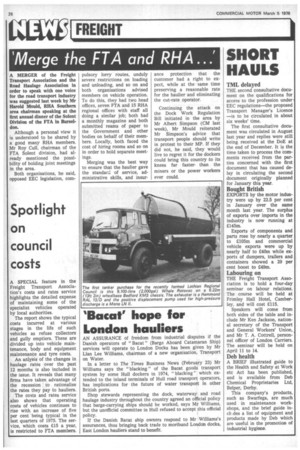'Merge the FTA and RHA...'
Page 28

If you've noticed an error in this article please click here to report it so we can fix it.
A MERGER of the Freight Transport Association and the Road Haulage Association in order to speak with one voice for the road transport industry was suggested last week by Mr Harold Mould, RHA Southern area chairman speaking at the first annual dinner of the Solent Division of the FM in Burseldon.
Although a personal view it is understood to be shared by a good many RHA members. Mr Roy Cull, chairman of the FTA Solent division, had already mentioned the possibility of holding joint meetings in the area.
Both organisations, he said, opposed EEC legislation, corn pulsory lorry routes, unduly severe restrictions on loading and unloading, and so on and both organisations advised members on vehicle operation. To do this, they had two head offices, seven FTA and 15 RHA regional offices with staff all doing a similar job; both had a monthly magazine and both submitted reams of paper to the Government and other bodies on behalf of their members. Locally, both faced the cost of hiring rooms and so on in order to hold separate meetings.
Merging was the best way to ensure that the haulier gave the standard of service, administrative skills, and insur ance protection that the customer had a right to expect, while at the same time preserving a reasonable rate for the haulier and eliminating the cut-rate operator.
Continuing the attack on the Dock Work Regulation Bill initiated in the area by Mr Albert Simpson (CM last week), Mr Mould reiterated Mr Simpson's advice that transport people should write in protest to their MP. If they did not, he said, they would live to regret it for the dockers could bring this country to its knees far faster, than the miners or the power workers ever could.




















































































































































